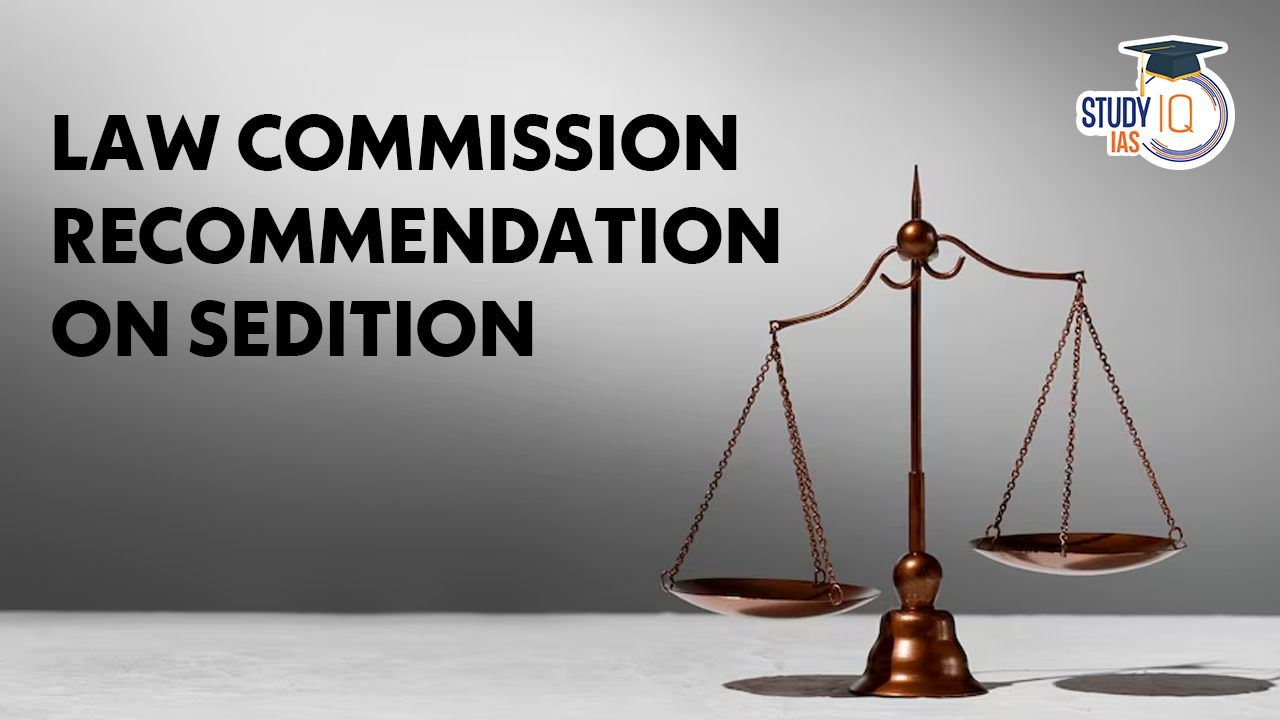Table of Contents
Context: The Law Commission of India released its 279th Report which recommended retaining the provision of Sedition under Section 124A of the Indian Penal Code, 1860.
More on the News
- In May 2022, the Supreme court had suspended the use of Section 124A, stalling pending criminal trials and court proceedings under the section across the country.
- Section 124A of IPC describes sedition as ‘attempts to excite disaffection against the Government established by law’.
- The provision has been widely criticized for being a tool for curbing dissent.
- However, allegations were made by petitioners that arrests and prosecutions under Section 124A were continuing despite the freeze.
- The Union government responded regarding this conveying to the Supreme Court that it has initiated the process for reexamining the sedition law (Section 124A of IPC).
- Following this, Law Commission of India in its 279th Report recommended retaining the provision of Sedition under Section 124A.
Recommendations of the Law Commission
- Incorporating the Kedar Nath Judgement: The Law Commission report states that the essence of Kedar Nath v Star of Bihar (1962) needs to be incorporated in Section 124A.
- Kedar Nath upheld the constitutionality of the Sedition Law stating that it falls within the ‘reasonable restrictions’ on freedom of speech mentioned under Article 19(2) of the Constitution.
- The Court ruled that the offence of sedition can be established when the words or actions tend to incite violence or lead to public disorder.
- However, the report states that Section 124A, as it currently reads, fails to clearly cull out the meaning of these actions, resulting in its vague interpretation.
- Installing a New Procedural ‘Safeguard’
- The Commission recommends a major procedural amendment to the Code of Criminal Procedure, 1973 (CrPC) to prevent the ‘alleged misuse’ of the law.
- It suggests that a police officer, holding the rank of an Inspector or higher, must conduct a preliminary inquiry before the First Information Report (FIR) is filed.
- Subsequently, based on the findings of the inquiry report, the Central Government may or may not grant permission to file an FIR.
- This amendment is to be made to Section 154 of the CrPC.
- The Law Commission highlights that this recommendation was made after taking into consideration the observations of the Supreme Court in S.G. Vombatkere regarding the potential misuse of the law.
- Increasing the term of punishment:
- The Commission recommends enhancing the punishment to a period of seven years or life imprisonment, along with a fine.
- Currently, the punishment is a period of imprisonment of either three years or life imprisonment.
- The report describes this punishment as ‘odd’ as there is a discrepancy among other provisions found in Chapter VI of IPC, which lists the ‘Offences against the State’.
- Section 124A is found here. The report aims to address this inconsistency by aligning the punishment of Section 124A with other provisions under Chapter VI.
- Inserting New Words in the Provision:
- The Report recommends the insertion of the words ‘tendency to incite violence or cause public disorder’ in the provision.
- It defines ‘tendency’ as an ‘inclination to incite violence or public disorder rather than proof of actual violence or imminent threat to violence’.
- Thus, the consequence of an action won’t be considered if ‘inclination’ is established.
- The Report highlights that Kedar Nath established that proof of violence is not necessary to establish the offence of sedition.
- Instead, the Judgement primarily relies on the tendency of the words or actions to incite violence or disturb public order.
Reasons for Retaining
The Report justifies retaining Section 124A on five aspects:
- It is necessary to protect national security from the threat of radical, anti-national, and secessionist elements. They reasoned that the growth of social media has played a role in propagating radical thoughts against India, often instigated and facilitated by ‘adversarial foreign powers’.
- It is a ‘reasonable restriction’ to the fundamental right of speech and expression found under Article 19(1)(a) of the Indian Constitution. They reasoned that the restrictions of ‘public order’, and ‘incitement to an offence’ fall within the ambit of Sedition law.
- It is the ‘traditional penal mechanism’ to address the issue of terrorism. It argues that the mere presence of other counter-terrorism and security laws, such as the Unlawful Activities Prevention Act, 1967, and the National Security Act, 1980, is not a sufficient reason to abolish the sedition law. The report states that without the sedition law, individuals involved in seditious activities could potentially be prosecuted under these special laws, which often carry more stringent provisions.
- The Report states that ‘colonial legacy’ is not a strong enough basis for striking down the law in India’s modern democratic context. It points out that other colonial legacies like the Police Forces and All India Civil Services are still retained without opposition on this ground.
- The report highlights that in countries where sedition laws have been struck down, other laws addressing seditious activities have been incorporated within their treason and counter-terrorism laws.
What is Sedition?
- Sedition under IPC 124A is defined as an attempt to bring in hatred or contempt or excites or attempts to excite disaffection towards the government established according to the law.
- The expression “disaffection” includes disloyalty and all feelings of enmity.
- Comments expressing disapprobation of Government measures with a view to obtain their alteration by lawful means, without exciting hatred, contempt or disaffection, will not constitute an offence under this section;
- Comments expressing disapprobation of the administrative or Government action without exciting hatred, contempt or disaffection, will not constitute an offence under this section.
- Sedition was included as an offence in 1890 under section 124A IPC through the Special Act XVII.
- Punishment:
- It is a non-bailable law that is punishable with imprisonment from three years up to life, along with a fine.
- Individual charged under the law will be barred from a government job and their passport is seized by the government.
- Origin of sedition law:
- Sedition comes under Section 124A Indian Penal Code (IPC). The law was drafted by British historian-politician Thomas Babington Macaulay in 1837.
- The British colonial government used the law to primarily suppress the writings and speeches of prominent Indian freedom fighters.
- Mahatma Gandhi, Lokmanya Tilak, and Jogendra Chandra Bose were some of the leaders who were charged under the law, for questioning colonial administration.
- During process of constitution framing, the sedition law was opposed by members of Constitutional Assembly, such as K.M. Munshi, who argued that such a draconian law is a threat to democracy in India.
- The word sedition was omitted from the Constitution due to the persistent efforts of Bhupinder Singh Mann.

Stats IQ: Sedition cases in India
- NCRB data shows that sedition cases have risen from 47 in 2014 to 93 in 2019, a massive growth of 163 percent.
- Conviction rate: The conversion rate from cases to conviction is a mere 3 percent.
- Highest cases: Assam (76), Haryana (42 cases), Jharkhand (40), Karnataka (38), Andhra Pradesh (32) and Jammu and Kashmir (29).
- These states accounted for more than half the number of total sedition cases recorded in the country.
- Substantial cases: Manipur (28), Uttar Pradesh (27), Bihar (25), Kerala (25), Nagaland (17), Delhi (13), Himachal Pradesh (12), Rajasthan (12) and West Bengal (12) registered cases in double digits.
- Zero cases: Meghalaya, Mizoram, Andaman and Nicobar Islands, Chandigarh, Dadra and Nagar Haveli and Daman and Diu, and Puducherry did not register any sedition cases.
Judicial opinion on Sedition Law
- The Supreme Court in Romesh Thapar vs. State of Madras (1950) held that criticism of the government exciting disaffection or bad feelings towards it cannot be regarded as a justifying ground for restricting the freedom of expression and of the press.
- In Gopi Chand vs. The State (1951), and Ram Nandan vs. State of Uttar Pradesh (1959), courts declared that Section 124A of the IPC was unconstitutional.
- The Supreme Court in Kedar Nath Singh vs State of Bihar (1962) gave constitutional validity to sedition law.
- The court however said that unless accompanied by an incitement or call for violence, criticism of the government should not be called sedition.
- In Balwant Singh vs. State of Punjab (1995), the Supreme Court said that the real intent of the speech must be taken into account before labeling it seditious.
- In Rajat Sharma vs. the Union of India Case, 2021, the court ruled that disagreeing with the views and policies of the government will not be considered sedition.
- In Disha Ravi case, the Delhi High Court ruled that government cannot imprison citizens because of disagreeing with the state policies.
- In Farooq Abdullah case, the judiciary observed that expression of views of dissent, which is different from the opinion of the government, cannot be termed seditious.
Criticism of Sedition Law
- Violation of freedom of speech: Fundamental Right of freedom of speech is violated by the sedition law. This is considered a threat to democracy.
- Poorly defined: Assessing the exact nature of speech that can be considered sedition is very difficult due to the poor definition of the law. Distinguishing genuine expression of speech from seditious speech will be challenging.
- Misuse: There have been numerous instances where governments have misused the sedition law to curb dissent. Political opponents, journalists, social activists etc have been victims of the sedition law.
- Colonial legacy: Sedition law is a colonial legacy, which was used mainly to overcome popular movement. It is thus appropriate to give up this colonial burden.
- Regular invoking: Sedition law was supposed to be an extraordinary instrument that was to be used only when security and sovereignty of the country is threatened. However, it is invoked quite regularly, even on flimsy grounds.
- Low conviction: The conviction rate of sedition law is about 3%. This shows that the law is mainly used to create fear and silence any criticisms or dissent
Support for Sedition Law
- Territorial integrity: The law will help in tackling anti-national, secessionist and terrorist elements that threaten territorial integrity of the nation.
- Reasonable restriction: The Constitution allows reasonable restriction on freedom of speech and expression. This does not violate the fundamental rights.
- Stabilizing state: The sedition law protects the elected government from attempts to overthrow it using violence and illegal means.
Way Forward
- Democracy requires active participation of citizens in decision making process, including constructive criticisms of government policies.
- Sedition law has empowered the executive to use this ambiguous provision as an instrument to regulate public opinion and indiscriminately wield power.
- The need of the hour is to review this draconian law. Even if the law is not completely abolished, there has to be checks and balances imposed so as to reduce the misuse.


 Defence Acquisition Council (DAC): Role,...
Defence Acquisition Council (DAC): Role,...
 Alternate Wetting and Drying (AWD): A Cl...
Alternate Wetting and Drying (AWD): A Cl...
 Makaravilakku Festival: Significance, Ri...
Makaravilakku Festival: Significance, Ri...

























